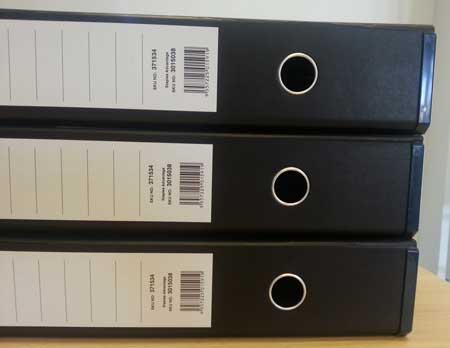
Are you short on space due to the number of filing cabinets in the office and do you actually know how long specific documents have to be kept for? Most small businesses will know that certain documents have to be kept for at least 12 months. Some for as long as seven years. However, there is no need to keep certain files and documents in the office. After all, some, you might only need if the Inland Revenue asks for them.
If that’s the case and you are a small business with cabinets full of these particular documents – maybe a solicitor or accountant – why not consider a self storage unit to house those papers that by law, you have to keep, but might never need?
A self storage unit at your local self storage centre will solve your business document storage issues. And as long as you label clearly, each file and store them neatly in a way that makes them easy to locate should you need to lay your hands on them, you will reap the rewards. Remember, DON’T just slot them in random files and throw them on an inaccessible shelf in your unit. It will make more work and create genuine frustration when it comes to locating individual files or papers.
So, back to the original question. Do you know which papers need to be kept and for how long, and which can be filed under ‘B’ for bin? Do you know how long receipts, tax returns and remittance advice slips need to be kept? Here’s a guide that will help you. The guide will also help individuals who don’t run a business but find themselves hoarding every piece of paper known to man!
Papers you can throw after a year or less
Credit card bills. These can be shredded after you have checked your statements, and paid what you owe. One exception is if you need the statement showing a charge that is under warranty. If so, make sure to staple the bill to the warranty and keep in a separate warranty file.
Bank account statements. Once you’ve reconciled your statements, they can be shredded too. However, as with the credit card bills, you need to keep them with tax documents if you are taking a deduction.
Monthly and quarterly investment statements can be shredded when you get new statements in. Annual investment statements, though, should be kept until you sell the investments. You should also keep annual statements for tax purposes and in folders separated by deductible and non-deductible accounts.
Unless you are using Receipts for back-up information for taxes and warranties, most receipts can be instantly shredded. Insurance policies can be shredded as soon as you receive your renewal.
Documents you can get rid of after a limited time
Loan documents should be kept until the loan is paid off whilst Vehicle records are best kept for as long as you have the vehicle. They may be needed for warranty information. You should keep titles, purchase receipts and registration information in a secure place for as long as you own the vehicle in question. After ownership is transferred, you can get rid of these documents.
Records you should keep for seven years
For the most part, only tax records need to be kept for seven years. You should keep copies of your tax returns with their supporting documents (statements, receipts, etc.). It’s advisable to put tax documents and supporting papers in a labelled envelope with the tax year clearly marked on the front. This will make them easy to find if you are asked to provide information for a specific year.
If you’re a business this HMRC link will take you to their record storage information pages. There’s more useful information there.
Documents you should keep for a lifetime
Birth, marriage, divorce, military discharge, social security and death documents need to be kept, forever. Other items that you should hold on to include life insurance policies, defined benefit plan papers, estate planning.
Here at Space Centre Self Storage we deal with many small businesses who keep their files and documents with us. We not only provide secure, damp free units in the North Bristol and Gloucestershire areas of south west England, but easy access too. This helps those businesses who have units with us to access files and papers whenever they need to.
Even if you’re not sure and don’t want to risk throwing something away, the key is to be organised. Make sure your records are filed and labelled so you can locate them easily if they’re needed.
Are you a business using storage facilities to keep your paperwork safe? If you’ve got additional tips let us know in the comments box.